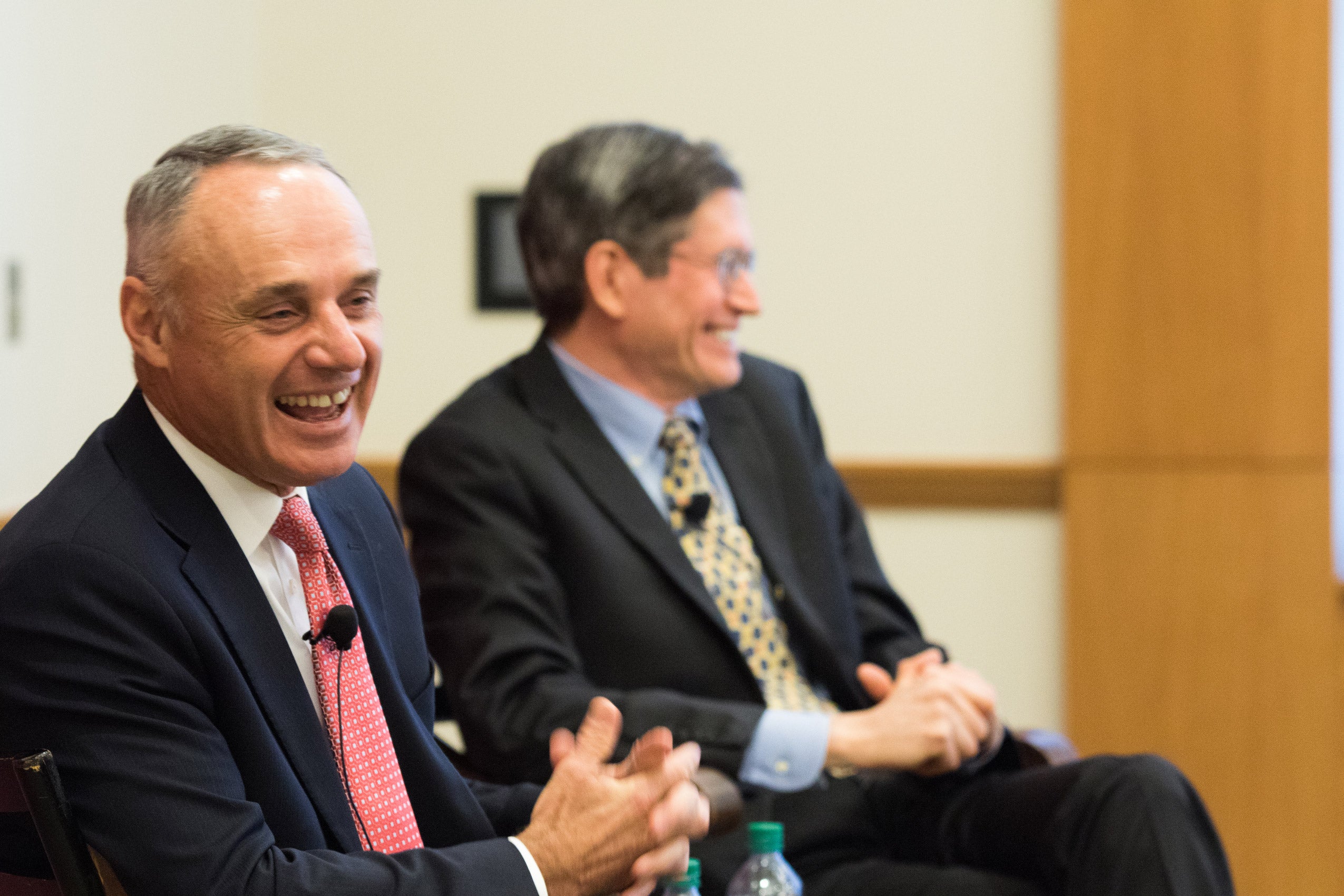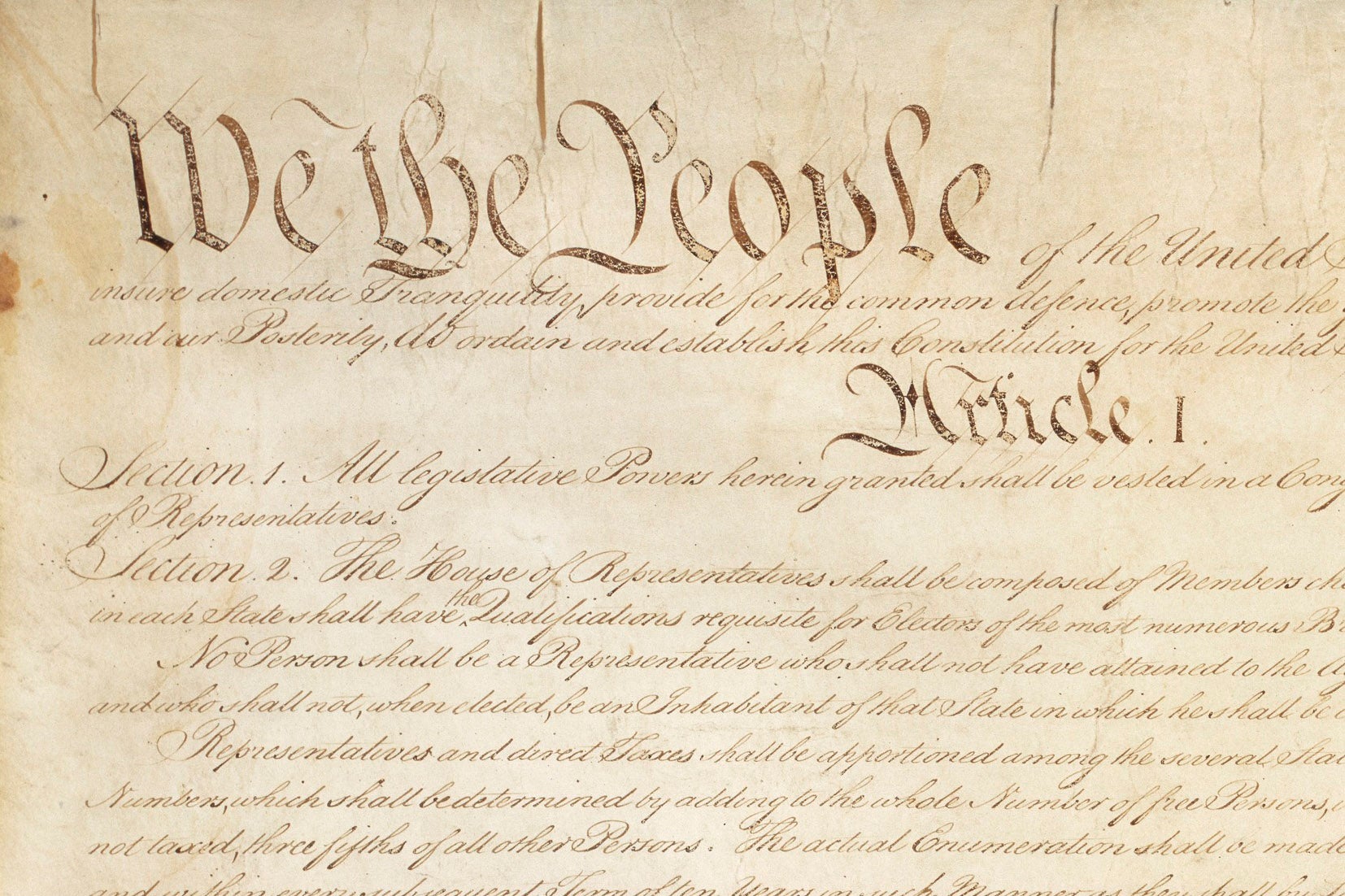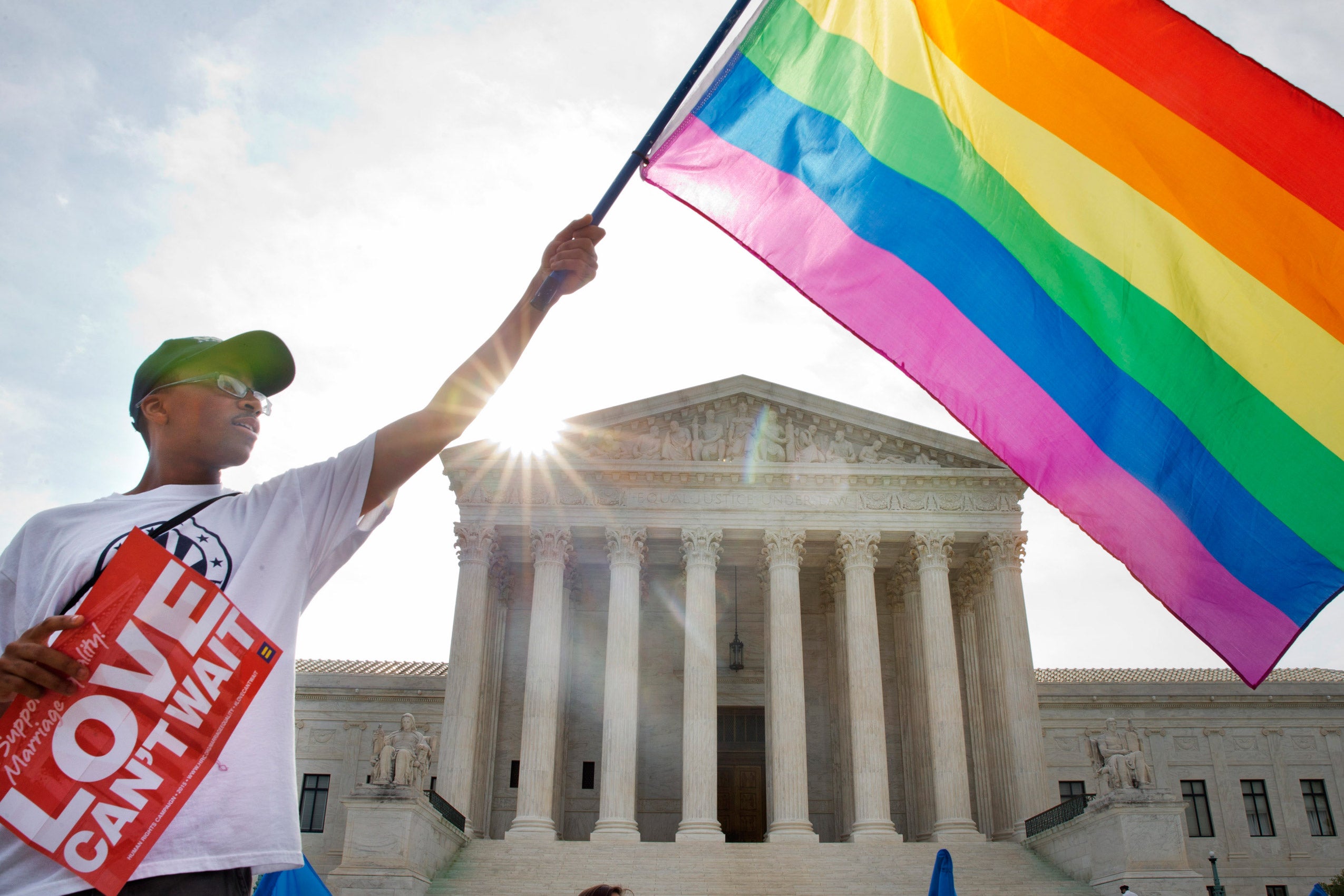People
Michael Klarman
-
Podcast: Hamilton, the man and the musical
June 10, 2016
The 70th Annual Tony Awards will be held in New York City on Sunday, June 12, and the big winner is expected to be Hamilton, Lin-Manuel Miranda’s musical adaptation of Ron Chernow’s biography of the famous Founding Father...Joining We the People to remember “the 10-dollar founding father without a father” are two of the nation’s leading legal historians. Annette Gordon-Reed is the Charles Warren Professor of American Legal History at Harvard Law School. She is also the Carol K. Pforzheimer Professor at the Radcliffe Institute for Advanced Study and a Professor of History in the Harvard Faculty of Arts & Sciences. Michael Klarman is the Kirkland & Ellis Professor of Law at Harvard Law School.
-
Commissioner Rob Manfred was at Harvard Law School on Tuesday for a brief but informative talk, one that covered new ground on several key issues. The conversation began with a half hour of questions from Professor Michael Klarman and was followed by 20 minutes of questions from students in the audience...Manfred was a graduate of Harvard Law in the class of 1983, after which he worked at a large law firm called Morgan, Lewis, & Bockius, where he specialized in labor and employment law. It was that practice that led him to baseball, as the firm was hired by the league around the time of the 1990 lockout. Manfred would continue to work with MLB as outside counsel through the 90s, a period which included several highly contentious labor struggles, including the 1994 strike.
-
Inside baseball: MLB Commissioner Rob Manfred ’83 on rules, rulings and marketing ‘the American pastime’
February 4, 2016
Major League Baseball Commissioner Rob Manfred '83 recently spoke with Harvard Law Today reporter Jonathan Topaz ’18 about his time at HLS and some pressing issues facing the MLB.
-
Harvard scholars commemorate Constitution Day
September 17, 2015
In celebration of Constitution Day—the annual commemoration of the signing of the U.S. Constitution on Sept. 17, 1787—several Harvard Law School professors spoke about the document upon which the American legal and political systems have been built.
-
An op-ed by Michael Klarman. The Supreme Court reflects shifting social mores at least as much as it influences them. Rulings such as Brown v. Board of Education and Obergefell were inconceivable until enormous changes in the surrounding social and political context had first occurred. Before Brown, President Franklin D. Roosevelt appointed the first black general in American history, President Harry S Truman issued executive orders desegregating the federal military and the civil service, and Jackie Robinson desegregated major league baseball. Even in the South, black voter registration increased from 3 percent in 1940 to 20 percent in 1950, and blacks began serving on juries and in local political offices for the first time since Reconstruction. Justice Sherman Minton noted “a different world today” with regard to race, during the Brown deliberations, and Felix Frankfurter remarked upon “the great changes in the relations between white and [black] people.”
-
Kennedy Key to Same-Sex Marriage Decision, Law Profs Say
June 29, 2015
Following the Supreme Court’s landmark decision Friday that same-sex couples have a constitutional right to marriage, several Harvard Law School professors said Justice Anthony M. Kennedy, who authored the majority opinion, played an extraordinary role in advancing the cause. “The majority opinion by Justice Kennedy was a triumph of reason and passion alike,” Law School professor and former Supreme Court clerk Laurence H. Tribe ’62 wrote in an email. ... Law School professor Michael J. Klarman wrote that Friday’s decision “confirms the extraordinary influence” of Kennedy, adding that he believes Kennedy is “the most powerful justice in history.” ... Law School professor Richard H. Fallon agreed that people opposed to same-sex marriage may be angry about the verdict, they are unlikely to act politically, given a shift in public support for same-sex marriage in recent years.
-
‘One for the ages’
June 27, 2015
It was the moment when gay marriage nationally went from being a cause to a fact. “This is one for the ages,” wrote Noah Feldman, Harvard’s Felix Frankfurter Professor of Law...Michael Klarman, Harvard’s Kirkland & Ellis Professor of Law and author of “From the Closet to the Altar: Courts, Backlash, and the Struggle for Same-Sex Marriage” (2012), called the ruling “the Brown v. Board of the gays rights movement. It’s obviously a great day for gay rights and for those who favor a more equal, inclusive America.”
-
Supreme Court justices have malleable view of democracy
June 27, 2015
An op-ed by Michael Klarman. By a narrow 5-to-4 majority, the Supreme Court in Obergefell v. Hodges has ruled that the US Constitution requires states to permit gay and lesbian couples to marry. The decision raises many interesting questions about the court and its role in American society: the extraordinary influence of one man (Justice Anthony Kennedy) on the court’s decision-making, the malleability of constitutional interpretation in the face of rapidly shifting social norms, and the justices’ willingness/reluctance to advance beyond public opinion in their constitutional interpretations. Yet the most interesting aspect of Obergefell may be the way the conservative justices chose to frame the issue in their four separate dissents: Each criticized the court’s refusal to defer to democratic decision making on the issue of gay marriage.
-
Harvard Law School: The road to marriage equality
June 26, 2015
Since at least 1983, when Harvard Law student Evan Wolfson ’83 wrote a third-year paper exploring a human rights argument for same-sex marriage, Harvard Law School has participated in anticipating, shaping, critiquing, analyzing and guiding the long path toward marriage equality.
-
The Roberts Court
June 1, 2015
To honor the life work of Ruth Bader Ginsburg, L ’59, LL.D. ’11, an associate justice of the Supreme Court of the United States (SCOTUS), the Radcliffe Institute for Advanced Study (RIAS) convened a panel discussion of the Roberts Court on Radcliffe Day, traditionally held on the Friday after Commencement...The panel, she said, would discuss some of these calls, moderated by Margaret H. Marshall, Ed.M. ’69, former chief justice of the Supreme Judicial Court of Massachusetts, and senior research fellow and lecturer on law at Harvard Law School. “I cannot think of a better umpire,” Cohen said of Marshall, who received the Radcliffe Medal in 2012 (she is also a director of Harvard Magazine Inc.). The panelists were Linda Greenhouse ’68, former Supreme Court correspondent for The New York Times, now a journalist in residence and lecturer at Yale Law School; Michael Klarman, Kirkland & Ellis Professor at Harvard Law School, the author of the Harvard Magazine feature “How Same-Sex Marriage Came to Be”; Lauren Sudeall Lucas, J.D. ’05, an assistant professor at Georgia State University College of Law; and John Manning ’82, J.D. ’85, Bromley professor of law at HLS.
-
Harvard honors Ginsburg for gender-equality advocacy
June 1, 2015
The Notorious RBG was in town Friday. That’s Ruth Bader Ginsburg. Yes, the Supreme Court justice, honored at Harvard University for her work as a pioneer in gender equality, is having a cultural moment...Michael Klarman, a Harvard Law School professor, told stories of Ginsburg’s long push for gender equity in her professional — and personal — life. At one point during her time as a professor, Supreme Court litigator, and speaker in demand across the country, said Klarman, she received a series of calls about her son James acting up in class. “Finally, exasperated at the repeated phone calls, Ginsburg responded to one of them as follows: ‘This child has two parents. I suggest from now on you alternate between them when you need to speak to someone about James,’ ” said Klarman, who once clerked for the justice. “Ginsburg reports that even though James’s behavior did not materially improve, the phone calls ceased because the school would not dream of bothering a busy male tax attorney.”
-
Recognized as a force for change
May 28, 2015
“We present the Radcliffe Medal to an individual who has been a powerful and impressive force for change, someone who takes risks and forges ahead. These are hallmarks of Radcliffe.” Lizabeth Cohen, dean of the Radcliffe Institute for Advanced Study, made this statement in announcing that Ruth Bader Ginsburg, associate justice of the Supreme Court of the United States, is this year’s Radcliffe Medal recipient...Moderated by Margaret H. Marshall, Ed.M. ’69, a former chief justice of the Supreme Judicial Court of Massachusetts, a senior research fellow and lecturer on law at Harvard Law School, and the 2012 Radcliffe Medalist, “A Decade of Decisions and Dissents” will feature the following panelists: Linda Greenhouse ’68, Knight Distinguished Journalist-in-Residence and Joseph Goldstein Lecturer in Law, Yale Law School, and former Supreme Court correspondent, The New York Times; Michael Klarman, Kirkland & Ellis Professor, Harvard Law School; Lauren Sudeall Lucas, J.D. ’05, assistant professor of law, Georgia State University College of Law; John Manning ’82, J.D. ’85, Bruce Bromley Professor of Law, Harvard Law School.
-
The Supreme Court today heard arguments in Obergefell v. Hodges, a case which is likely to go down in the history books alongside other landmark civil rights cases. This one centers on two questions: first, whether there is a constitutional right to gay marriage, and second, if not, whether states that have bans on gay marriage have to recognize gay marriages performed in other states where it’s legal. Here & Now’s Jeremy Hobson talks with Harvard Law School professor Michael Klarman about the significance of Obergefell v. Hodges and where it fits in with other landmark Supreme Court cases, such as Brown v. Board of Education and Roe v. Wade.
-
It was the early 1980s, and Mary Bonauto was a college student in upstate New York, struggling to come out as gay. She turned to a priest for help but left convinced her church would not accept her. Unsure where to turn, she felt her life might “be over.” “The law was one way of making sure my life wouldn’t be over,” she recently recalled. “I could either just suffer from the system or change the system. I decided to opt on the change-the-system side.” ...“Mary Bonauto’s contributions to the gay rights movement are analogous to those of Thurgood Marshall to the civil rights movement and Ruth Bader Ginsburg to the women’s rights movement,” Michael Klarman, a Harvard Law School professor, said in an e-mail.
-
...As the Supreme Court prepares to hear arguments on same-sex marriage on Tuesday, the nation seems more ready to accept it than many imagined even a year ago. But divisions remain, and while more than half of Americans now endorse the idea, about one-third say they oppose it, according to survey data from 2014...“As more couples marry, more people will know people who are married,” said Michael J. Klarman, a legal historian at the Harvard Law School and author of a 2012 book on earlier same-sex marriage rulings. “And those who oppose it will find out that the sky doesn’t fall.”
-
Another day, another town. Ryan T. Anderson, the conservative movement’s fresh-faced, millennial, Ivy League-educated spokesman against same-sex marriage, has another busy schedule. ... Discourteous is not a description usually applied to Anderson. “He’s a smart, likeable, very well-educated young person: an ideal spokesperson for the opposition to gay marriage,” Harvard law professor Michael Klarman, who recently sparred with Anderson at a law school event, writes in an e-mail. But Klarman, who wrote the book “From the Closet to the Altar: Courts, Backlash, and the Struggle for Same-Sex Marriage,” adds, “It’s almost inconceivable to me that he persuaded anyone in the audience by his arguments.”
-
The Supreme Court on Monday gave its strongest signal yet that the legal fight for nationwide gay marriage has been won even before the issue is argued in April. The justices, with only two dissenting votes, turned down Alabama’s plea to delay same-sex marriages, clearing the way for gay couples to seek marriage licenses for the first time in the Deep South. A federal judge in Alabama had struck down in January the state’s law limiting marriage to a man and a woman...“It seems almost inconceivable that there are not five votes now for gay marriage, and I think a lot of us are wondering if the chief justice won’t be sorely tempted to be a sixth vote,” said Harvard law professor Michael Klarman, who has written about the fight for same-sex marriage.
-
Same-Sex Marriage Likely, Not Guaranteed, Law School Profs Predict
January 22, 2015
Following a Supreme Court decision last Friday to hear arguments on the issue of same-sex marriage, several Harvard Law School professors predict that the Court will grant a historic constitutional right to same-sex marriage nationwide, but they say a more moderate outcome remains a possibility...“I would guess that the best reading of the tea leaves is that there will be five votes upholding a right to gay marriage,” Richard H. Fallon, a Law School professor, said. He along with Charles Fried and Michael J. Klarman, also Law School professors, identified Justice Anthony Kennedy as the potential “swing vote.”...Law School professor and former Supreme Court clerk Laurence H. Tribe ’62 echoed the prediction in an email, writing that the he thinks the Court will “hold that the U.S. Constitution requires universal marriage equality.”...Mark V. Tushnet ’67, a Law School professor and former Supreme Court clerk, said that the addition of the second question allows the Court to “deal with the issue comprehensively, no matter the which way the first question came out.”
-
In Justices’ Calculations on Gay Marriage, a Legal Golden Ratio Looms
November 24, 2014
The Constitution is not a math problem, but numbers can play a role in the Supreme Court’s calculations. When the court struck down bans on interracial marriage in 1967, such unions were still illegal in 16 states. When the court struck down laws making gay sex a crime in 2003, 13 states still had antisodomy measures. Should the court take up the question of same-sex marriage this term or next, as it seems likely to, the unions will be against the law in no more than 15 states. ...But the comparisons are not completely airtight, said Michael J. Klarman, a legal historian at Harvard Law School. The decision on interracial marriage in Loving v. Virginia, he said, followed democratic consensus. State legislatures, not judges, had done almost all of the work in driving down the number of bans to 16.
-
Affiliates Laud Same-Sex Marriage Decision
October 9, 2014
While students active in the queer community said that they welcomed the Supreme Court’s decision Monday to let lower court judgments allowing gay marriage stand, some said that they worried that the issue of same-sex marriage overshadows other concerns of the BGLTQ community...Harvard Law School professor Michael J. Klarman said that he was surprised that the Court opted to uphold the lower court rulings rather than hear the case. He added that public support for same-sex marriage has been on the rise in recent years. “The future seems pretty clearly inevitable, in that [public] opinion is going to move in the direction of gay marriage even if the Court doesn’t intervene,” Klarman said.
-
Better late than never: Expect a high court OK on marriage equality soon
September 22, 2014
An op-ed by Michael Klarman. Over the last year, lower federal court judges have removed most of the suspense from the questions of whether and when the Supreme Court might rule marriage equality to be a federal constitutional right. In case after case, in red states and blue, judges have ruled that same-sex marriage bans are unconstitutional. This makes it very likely that the Supreme Court will grant review in such a case this year, and even more likely, assuming it does, that it will rule that the Constitution requires states to extend marriage equality to gay couples.


